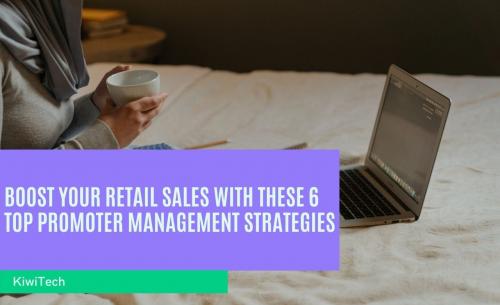Boost Your Retail Sales with These 6 Top Promoter Management Strategies

Large-format stores form the nerve centre of top retail corporations today. With heavy footfall, ample display, and merchandising options, these anchor stores are excellent for promoting brand awareness. For this, in-store promoters are ideal for streamlining brand promotional activities like sampling and fostering direct sales. They are also responsible for arranging shelves and replenishing stock for their brand merchandise.
Promoter management helps in strategizing this team of in-store promoters. As the face of your brand in direct contact with customers, these promoters need to be well-groomed, articulate, knowledgeable, and confident. They also need to be punctual, efficient and strike the right chord with your target market segments.
Significant Challenges in Managing In-Store Brand Promoters
When it comes to managing your team of in-store brand promoters, the following challenges are often prevalent:
Hiring entry-level promoters with minimal qualifications
Lack of communication skills or customer-friendly disposition
Limited budgets for promoter remuneration, thereby diminishing motivation
High attrition rate amongst promoters
Lack of productivity arising from negligence and lack of supervision
Inadequate training resources and methods
Top Promoter Management Strategies to Boost Sales
Countering the challenges mentioned above and harnessing the potential of your in-store brand promoters, these six strategies are highly effective:
Embracing Automation:
No matter how deeply the top management scrutinizes promoters, the system is too vast and complex to attain total control. Relying on suitable AI-driven tools and digitization is the only plausible solution for effective promoter management. Capturing and apprehending real-time data for performance assessment and customer insights is the key to success.
Geo-Fencing of Stores:
While this strategy is a part of sales force automation, it deserves special mention. This is owing to its sheer convenience in managing employees at remote locations. It nullifies the requirement of manually taking/punching attendance and sending reports daily.
Intelligent Reporting Formats:
Sticking to outdated reporting formats is the biggest faux pas for any retail chain. With changing times, one needs to evolve the different reports for getting precision-based, actionable insights. Real-time dashboards with seamless access to critical store metrics are necessary for this era of cut-throat competition. Not only do these enable strategic decision-making, but they also help in performance evaluation and appraisals.
Mobile Training Modules with Stringent Compliance Points:
Investing in the training of your in-store promoters is crucial for their optimal performance. Due to different shifts, it is not always feasible to gather for a joint online training session. The best way is to organize smartphone-friendly training modules that they can attend at their convenience. Ensure that there are strict compliance checks, assignments, and evaluations periodically. At the end of the day, there needs to be proper assimilation of the learning and its hands-on implementation.
Strategize a Realistic Incentive Structure:
A realistic incentive structure is the mid-point between how much you can spend and what your brand promoters expect. Always set sales targets that are realistic yet lucrative. For a majority of retail chains in India, their in-store promoters are on third-party payroll. They are usually college freshers or interns with bare minimum qualifications. Therefore, they do not draw an attractive pay package or any work benefits. Yet, they are a crucial face for your brand and need to be incentivized. With real-time performance metrics and AI-driven assessment, you can fix incentives for high performers to keep them motivated.
Outsource to an Expert Team
Very few businesses have the required experience and technical expertise to entirely manage promoters via in-house strategies and systems. Outsourcing this part of your retail sales management portfolio makes sense as it is way more cost-effective. Liaising with teams that specialize in salesforce management will help you save on time, money, and resources. This, in turn, will give you maximum ROI from your in-store promotional campaigns.
Conclusion
Retail sales management is a complex and diverse zone, buzzing with constant changes and advancements. Keeping a tab on your brand promoters stationed at multiple stores across various cities is incredibly challenging. These challenges can be tackled by creating an ecosystem of well-connected and highly motivated sales teams with sales force automation. Furthermore, optimal performance tracking and productivity monitoring can help you tap their potential to the fullest, thereby boosting retail sales.
Post Your Ad Here
Comments